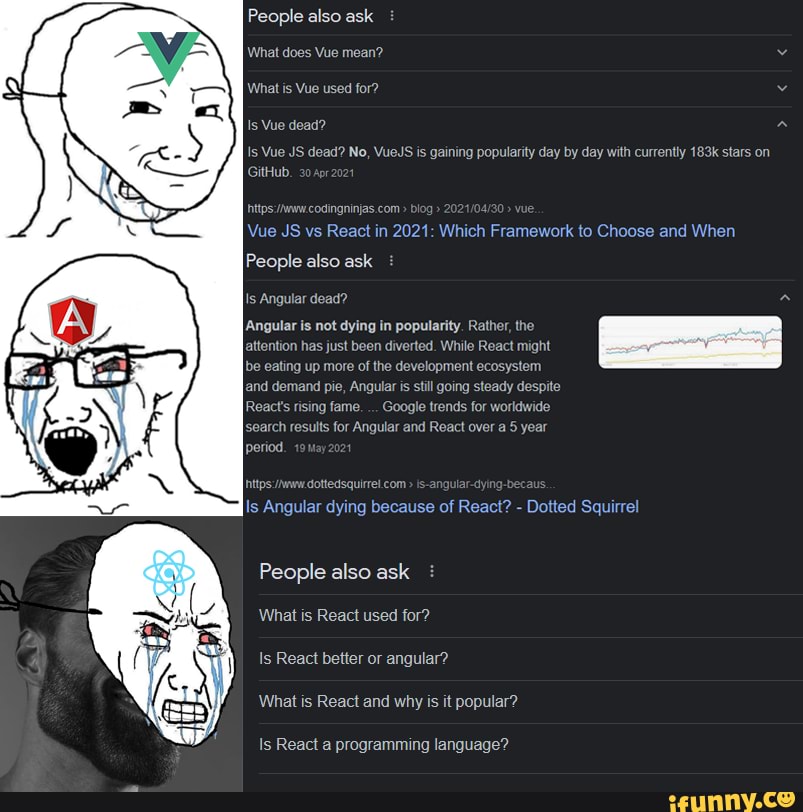
Is Google using Vue?
Is Google, the tech behemoth, using Vue.js in their stack? What factors would potentially drive such a choice? Is Vue.js up to the challenge of supporting the complex needs of one of the world’s most progressive tech companies? These questions often roam around the tech community and form the basis of our discussion today.
A large scale utilization of Vue.js in Google’s development stack is not evident as per the data available publicly. Resources such as StackShare.io corroborate this, listing platforms and languages like AngularJS, Python, and Java amongst the major ones in Google’s tech stack, but leaving out Vue.js. Further, surveys by Stack Overflow in the USA have shown a discernible lean towards React.js and Angular.js over Vue.js. Despite the impressive progress of Vue.js, the tech community often finds itself questioning the rationale behind its adoption over industry favorites like React.js and Angular.js, fueling the debate whether Google is really using Vue or not.
In this article, You will learn about the Vue.js framework’s potential and its practical usage. We will delve into an analysis of its capabilities, adoption trends, and compare it with other popular JavaScript frameworks, such as Angular and React. We will also attempt to infer whether Google indeed incorporates Vue.js in their tech stack and the underlying reasons, if any. Further, we will enlist the perspectives of tech experts and data from surveys to provide a broader understanding.
Readers will gain insights into the JavaScript landscape, how it’s evolving, and the place of Vue.js within it. We will present information in a simple, engaging manner enabling the readers to make informed decisions about Vue.js and its potential usage. Buckle up for a thrilling journey through the dynamic world of JavaScript frameworks.

Understanding the Definitions of Google and Vue
Google is a multinational technology company that specializes in Internet-related services and products. These include search engines, online advertising technologies, cloud computing, software development, and more.
Vue, also known as Vue.js, is a popular JavaScript framework for creating user interfaces. It allows developers to build web applications using reusable components, leading to code that’s easier to maintain and test.
No, Google itself does not use Vue. Their primary front-end frameworks are Angular and Polymer. However, Vue is used by some Google services, like Firebase, for specific user interface tasks. Google also acknowledges and supports the use of Vue in their Google Cloud Platform, though it’s not their default choice.
Vue and Google: An Unverified Partnership?
Google’s Tryst with Vue.js
Google’s exploration of Vue.js, a progressive JavaScript framework, has been creating ripples in the tech industry. Vue.js, developed by ex-Google employee Evan You, is globally recognized for its ease of use, flexibility, and improvisation over other existing frameworks like Angular.js (also a Google product) or React.js. Vue’s flexibility allows for a more customizable interaction design, making it highly appealing for tech giants like Google, although Google has not officially announced its adoption of Vue.js, there has been speculation due to a noticeable rise in Google domains using Vue.js.
While Google is known for its affinity for in-house developed products, the possible inclination towards Vue.js could be seen as part of Google’s strategy for staying ahead in the rapidly evolving tech landscape. Recognizing the strength of Vue.js in terms of its lightweight size, ease of integration, and community support, Google might leverage these benefits to enhance its user interface experience.
Vested Interest or Technological Migration?
On the other hand, there are views suggesting Google’s interest in Vue could also be directed towards learning from its strengths and enhancing their own Angular.js. Google’s history of adopting and abandoning technologies implies a mixture of both – a love story and a bluff. Only time will reveal the exact story behind this tech dance.
Despite the ambiguity, the influence of Vue’s features on Google’s products and services is undeniable. For instance, the surge in Vue’s usage in several Google domains is already noticeable in areas like:
- Improving the scalability and performance of web applications
- Enhancing the flexibility of integrations with other software tools
- Boosting client-side development with its comprehensive documentation and ease-of-use
In conclusion, whether Google’s experiment with Vue.js is an actual adoption or a means to learn and improve, it’s definitely changing the narrative for front-end development technologies. While we await Google’s official communication on this aspect, it’s clear that Vue.js is gaining traction and popularity among the tech community. Whether this signals a new era in Google’s front-end development or merely a fleeting romance is an unraveling tech saga to follow.
Are Google’s Virtual Fingers Dipped in the Vue Jar?
The Vue Conundrum: Adoption or Invasion?
Why is one of the most powerful companies in the world considering the use of a progressive framework like Vue? For a tech conglomerate like Google, it’s about improving efficiency and providing better user experiences. Vue came into the picture as a young, progressive framework that proved to be high-performing and very easy to integrate with existing systems. This was appealing to Google, as they are continuously looking for ways to enhance their services. The Vue library is a combination of some of the best features of Angular.js and React.js making it easier to create user interfaces. Despite its many benefits, adopting Vue doesn’t come without challenges.
Vue Meets Google: Problems Bubbling Underneath
The issue is not whether Vue is wrong for Google’s ecosystem but how it can cause disruption. Google has its own framework, Angular, which was built specifically for usage inside Google’s applications. Adoption of Vue implies the would-be deprecation of Angular – a framework Google has heavily invested in. Additionally, considering Google’s massive scale, implementing a shift to Vue would be a herculean task. It would require considerable training, code refactoring, with the risk of potential system outages and performance issues. Furthermore, the majority of Google’s engineers have their expertise grounded in Angular, not Vue. Transition to a new framework would require resources in terms of time and cost for skill adaptation, which could potentially delay product releases.
Best Practices: Inspiration from Market Leaders
Nevertheless, Vue’s adoption isn’t entirely implausible if planned and implemented correctly. Gitlab offers an enlightening example. Their tech stack included a mix of jQuery and Flight for front-end development. However, they started to realize that scalability and performance were becoming issues as the codebase grew. They made the choice to migrate to Vue, recognizing its agility and performance benefits. Careful planning was key; they knew it wasn’t a one-day shift. They gradually worked Vue into the codebase and re-wrote modules section by section, carrying out rigorous testing before completely migrating. Alibaba is another instance where Vue was adopted progressively. Today, Alibaba uses Vue for most of their front-end development attributing to its ease of integration, scalability, and the strong support community around it. While these examples and best practices don’t guarantee a smooth transition for Google, they surely do provide proven strategies and insights that Google might find worth considering.
The Hidden Connection: Unpacking Google’s Possible Use of Vue
Is Google’s Infrastructure Lit Up by Vue?
Have you ever wondered about the backbone of Google’s massive digital empire? Scratching beneath the surface reveals the web technology adopted by Google – but is it Vue? It is important to clarify that Vue.js, an increasingly popular JavaScript framework, is not the primary technology powering Google’s digital environment. Vue was developed by an ex-Google engineer, Evan You, but Google itself predominantly uses a combination of languages and frameworks, with AngularJS and Dart being more prevalent. Google may occasionally utilize Vue.js for some smaller projects due to its versatility and easy learning curve. Yet, Vue is not at the forefront of Google’s web development practices.
Understanding the Vue Predicament
The core issue here lies in the misconception that Google uses Vue as its main web technology. This misunderstanding probably stems from the fact that Vue was developed by a former Google engineer, combined with Vue’s surge in popularity. The truth, however, is more nuanced. AngularJS, a Google product, is widely used within its infrastructure. Dart, a programming language developed by Google, is also preferred for its web and mobile applications due to its more potent functionalities relative to JavaScript. While Vue is a stellar framework that offers simplicity and flexibility, it isn’t the main powerhouse fueling Google’s enormous digital infrastructure.
Assessing the Influence of Vue
The best practices in any industry emerge from a blend of utility, functionality, and efficiency, and the choices Google makes in its web development tools reflect this. Take, for example, Google’s use of AngularJS, a robust framework that enables developers to build dynamic, single-page applications. AngularJS can handle heavy applications and offers a wealth of features that support complex requirements, a deciding factor for Google. Dart, on the other hand, is favored by Google due to its efficiency and speed in building high-performing applications. Usage of Vue.js, while not as extensive, should not be discounted. It shines in its role, particularly for smaller projects where its simplicity and easy data flow management reign supreme. Instances such as the optimization of AdWords, one of Google’s marketing tools, bear testimony to this.
Conclusion
Have you ever pondered the intriguing fact about whether Google, one of the leading tech giants, is harnessing the power of Vue, a progressive framework for building user interfaces? To neatly tie up all the data and facts we have discussed, one fact is abundantly clear; Vue’s adaptability and ease of integration have been wooed by many formidable corporations. However, Google, to the best of the public’s knowledge, does not belong to this Vue-loving league. The company primarily relies on Angular, its home-grown scripting framework, to build interactive applications.
We encourage all curious minds and tech enthusiasts to keep up with us and click that ‘follow’ button on our blog to continue this knowledge-sharing journey. Your support fuels our motivation to dive deeper into the tech ocean and bring the most engrossing topics to light. And yes, you’ll want to stay tuned to our upcoming releases. We’re committed to providing reliable research and insights presented in accessible, compelling blogs – it’s our way of contributing valuable additions to your tech knowledge.
In conclusion, software developments are arguably the most fluent and dynamic of all sectors, with continuous innovations and upgrades transforming how we create and perceive technology. Stay keen, stay connected, and together we’ll dig deeper into the correlations and contrasts of our evolving digital world. We’re looking forward to exploring these fascinating topics, and more, in our future releases. You certainly won’t want to miss what’s coming next!
F.A.Q.
1. Does Google make use of Vue.js for its projects?
No, Google does not currently use Vue.js in its range of products. Google generally relies on its own framework, Angular, for most of its web application needs.
2. Why does Google not use Vue.js?
Google doesn’t use Vue.js because it has its own popular JavaScript framework, Angular, which serves its development needs. Furthermore, Angular is tightly integrated with Google’s other functionalities, making it more suitable for its development purposes.
3. Has Google made any comments about Vue.js?
Google has not officially commented on Vue.js. It’s important to note however that Vue.js is open-source and operates independently, so it’s not obligated to be endorsed or used by such tech giants as Google.
4. Is Vue.js used by any major companies?
Yes, many companies do use Vue.js. It’s deployed by corporations such as Alibaba, Xiaomi, and Laravel, largely due to its lightweight body and flexibility.
5. Should Vue.js be chosen for its popularity with tech giants?
No, a programming language or framework should not be chosen simply because it is used by large tech companies. Each tool has its own strengths and weaknesses, so it’s crucial to choose based on the needs and requirements of each individual project.